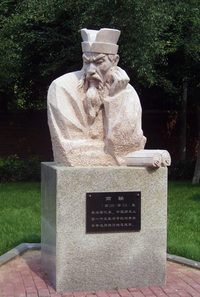
Wei Yang
Actor
Gongsun Yang (Pinyin) or Kung-Sun Yang (Wades-Gilles) 390–338 BCE, titles Shang Yang (), or Wei Yang of his birth state the State of Wei) was an important Chinese statesman of the State of Qin during the Warring States period. His policies laid the foundation that enabled Qin to conquer all of China, uniting the country for the first time and ushering in the Qin dynasty. He and his followers contributed to the Book of Lord Shang strain of what has modernly been termed Chinese Legalism. With the support of Duke Xiao of Qin, Gongsun left his lowly position in Wei (to whose ruling family he had been born, but had yet to obtain a high position in) to become the chief adviser in Qin. There his numerous reforms transformed the peripheral Qin state into a militarily powerful and strongly centralized kingdom. Changes to the state's legal system (which were said to have been built upon Li Kui's Canon of Laws) propelled the Qin to prosperity. Enhancing the administration through an emphasis on meritocracy, Gongsun's policies weakened the power of the feudal lords. Mark Edward Lewis once identified Gongsun's reorganization of the military as responsible the orderly plan of roads and fields throughout north China. This might be far fetched, but Gongsun was as much a military reformer as a legal one. Gongsun saw the construction of Xiangyang. The Shang Yang school of thought was favored by Emperor Wu of Han, and John Keay calls Tang figure Du You "enamored" of Shang Yang.
Gongsun Yang (Pinyin) or Kung-Sun Yang (Wades-Gilles) 390–338 BCE, titles Shang Yang (), or Wei Yang of his birth state the State of Wei) was an important Chinese statesman of the State of Qin during the Warring States period. His policies laid the foundation that enabled Qin to conquer all of China, uniting the country for the first time and ushering in the Qin dynasty. He and his followers contributed to the Book of Lord Shang strain of what has modernly been termed Chinese Legalism.
With the support of Duke Xiao of Qin, Gongsun left his lowly position in Wei (to whose ruling family he had been born, but had yet to obtain a high position in) to become the chief adviser in Qin. There his numerous reforms transformed the peripheral Qin state into a militarily powerful and strongly centralized kingdom. Changes to the state's legal system (which were said to have been built upon Li Kui's Canon of Laws) propelled the Qin to prosperity. Enhancing the administration through an emphasis on meritocracy, Gongsun's policies weakened the power of the feudal lords.
Mark Edward Lewis once identified Gongsun's reorganization of the military as responsible the orderly plan of roads and fields throughout north China. This might be far fetched, but Gongsun was as much a military reformer as a legal one. Gongsun saw the construction of Xiangyang.
The Shang Yang school of thought was favored by Emperor Wu of Han, and John Keay calls Tang figure Du You "enamored" of Shang Yang.
Wei Yang Movies & TV Shows - Watch Online



